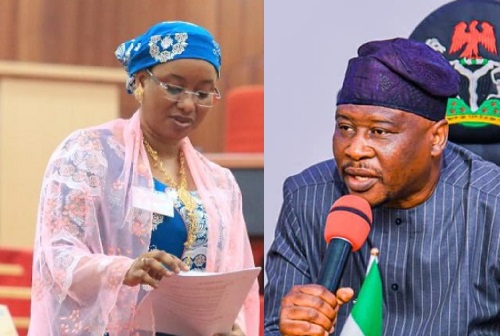Overtime and in a consistent order, women are unrelenting in asserting themselves in the political hemisphere essentially on account of male corrosive effects on political transparency and accountability. This begun in Aba in 1955 when women outnumbered their male counterpart voters in a citywide election.

By 1961, they had increased the tempo when Margaret Ekpo won a seat to the Eastern Regional House of Assembly, a position that allowed her to fight for issues affecting women at the time.
Those flashes of efforts by Nigerian women to bridge the gap of women’s under-representation in political and public life were reinforced by the 1995 Beijing Declaration which recommended Women’s equal participation in leadership.
It is perhaps, against this backdrop that legal luminary, Afe Babalola, SAN, in an article in Tribune Newspaper on July 7, 2022, frowned at the rejection of the Gender Equality Bill by the National Assembly saying the Bill was initiated to address the gender imbalance in governance.
According to the legal expert, the need to draft a constitution that will guarantee equity, fairness and justice to all Nigerians was one of the outstanding recommendations made at the National Conference which President Goodluck Jonathan called in 2014, after realizing that the current constitutional protections are not entirely effective in preventing discrimination based on sex, religion, or ethnicity.
Afe Babalola pointed out that the statistics on women’s involvement in politics in Nigeria are unsurprisingly low adding that much work still needs to be done to increase women’s opportunities for political participation.
In particular, he explained that a thorough examination of the information provided by the Independent National Electoral Commission indicates an insignificant percentage of women occupation of public office since 1999 stressing that “No woman has ever been chosen to lead a state in Nigeria as governor since 1999.”
Clearly, Afe Babalola’s submission speaks directly to the March 18 political somersaults in Adamawa State governorship election where the governor and Peoples
Democratic Party (PDP) candidate, Ahmadu Umaru Fintiri and the only 2023 female governorship candidate on the platform of the All Progressives Congress, APC, Aishat Dahiru Binani, are slugging it out.
Available data indicate that in the Adamawa governorship contest, Binani is not just facing an incumbent, she is also running against religious and cultural biases that have long stood against women in contests for power in the more conservative part of Nigeria.
However and hurtfully so, are powerful individuals at the centre of the twists and turns who exist within and outside benevolent and malevolent categories, ever ready to deconstruct extant political literature.
In a pre-election review, Boboye Abba, a Yola-based public analyst said “But if not for the incumbency factor, Aisha Binani has more support than Governor Umar Fintiri across the segments and the divides in Adamawa State, because of her open-handedness.”
He added that “wherever Binani went before the presidential election, her teeming supporters always showed her love and open support. If she asked them to vote for the APC from the president down to the governor, the crowd would reply ‘No! For the president, we will vote for Atiku Abubakar but in the state, we will vote for Binani’.
“ It showed that those who voted for Atiku in the presidential election may not vote for Fintiri in the governorship election, but for Binani. Attendance at her campaign rallies was more than that of her rivals, the incumbent governor cannot pull her kind of crowd. Because Fintiri does not give out welfare despite being the serving governor, that is why people like Binani,” Mr Abba said.
This review manifested clearly and captured the pattern of victory on March 18 when the election held but finally declared “inconclusive.”
Adamawa State Collation Officer, Professor Mohammed Mele, and the State Resident Electoral Commissioner, Mr Yakubu Ari, on Monday, March 20, after collation of results from 20 out of the 21 Local Government Areas, postponed the collation saying the postponement was to enable verification of results from Fufore Local Government Area which were snatched.
In her personal narrative, Aisha Binani stated that in some locations, BVAS was bypassed and governor Ahmadu Fintiri instigated the violence. “Let INEC conducts a review of some local government areas so that it will bring out the real figures scored by each candidate. As soon as that is done, we will be home and dry and we will be confident to go back to the field for a re-run,” she demanded.
To that effect, the APC candidate has made a formal request to INEC to have a “Certify True Copy of BVAS report/result in all the local government areas in Adamawa State for the March 18 guber election to enable me to study some irregularities carried out by the Peoples Democratic Party, PDP.”
In a letter from her legal representative, Sam Ologunorisa & Co, dated March 23 and titled: “Application For Certified True Copy of the Bio Modal Verification Authentication System, BVAS, Used For 2023 Adamawa State Governorship,” and addressed to the National Secretary of INEC, Binani specifically singled out Madagali and Michika council areas saying “It is well known that these two local government areas are under the severe consequence of insurgency and banditry whereby a huge number of their population had relocated to Mubi, Yola and other places . Yet, results returned from these places recorded the highest number ever in the history of election in the areas,” she stated.
In the face of this logjam, Yiaga Africa, a civil society organization, has requested the Independent National Electoral Commission, INEC to review concerns that have been raised about the conduct of the gubernatorial polls.
Further, the civil society requests the electoral body to pay attention to complaints saying “INEC should, in line with section 64 of the 2022 electoral act, review cases where legitimate concerns have been raised on the conduct and declarations made by collation and returning officers, especially instances where results declaration contravene the electoral legal framework.
Also, a Women’s group called Amazon has called on Nigerian women to rise up to the challenge in what the group describes as a deliberate attempt to deny women a governorship seat in 2023. During the week, the group gathered at Merit House, Abuja “To add our voice and demand that the right thing is done in Adamawa.”
In an unmistakable call on INEC to eliminate biases from its operations and promote confidence by attending to legitimate complaints especially from candidates who fell short changed, the European Union Election Observation Mission to Nigeria’s 2023 general elections has declared that owing to lack of transparency and operational failures, Nigerians have lost confidence and trust in INEC.
Speaking at a media briefing in Abuja to present the Mission’s second preliminary reports, the Chief Observer, Barry Andrews, noted that although Nigerians had great appetite for democracy and were keen to engage in various civic activities, their expectations were dashed as a result of the apathy recorded. The governorship elections conducted last Saturday was a clear consequence of failures by political elites and “unfortunately, INEC.”
Andrews said: “Obstruction and organized violence limited the free expression of the will of the voters, despite efforts by civil society to promote democratic standards.”




